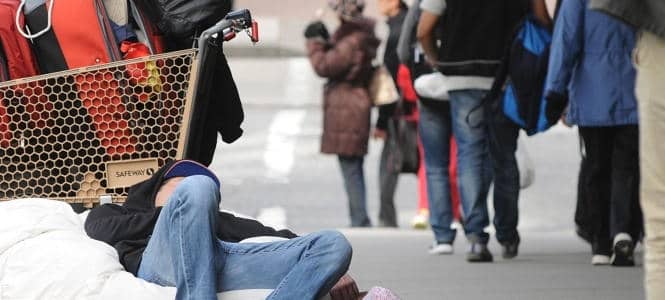

In California, Loitering is Treated as Three Separate Offenses:
Under the statute, loitering Penal Code 647 PC is essentially described as actions including: “linger”, “wander”, “delay” and “prowl”, on someone else’s property, without a proper purpose, and with the specific intent to commit a crime “if the opportunity arises” (emphasis added). This italicized element distinguishes the crime under PC 647(h) from that under PC 647(i). In short, the action of peeking into the door or window of an inhabited structure is already a specific intent crime by itself. “Specific intent” crimes are a category of crimes that require a perpetrator to do a specific act to bring about a specific result. On the other hand, there are also general intent crimes, which only require proof that the perpetrator committed an illegal act, and do not require the planned purpose to bring about a specific result.
To prove this crime, the prosecutor has to prove all of the following elements beyond a reasonable doubt:
It can be a difficult question to answer. Although, arguably, someone just standing around could theoretically fit the description of someone “loitering” Penal Code 647 PC, the case law in this area has distinguished criminal from non-criminal actions through a collection of factors like:
But even these factors have been subject to controversial interpretations. For instance, in a 1961 case, a man waiting around the Greyhound Bus Stop in San Francisco, supposedly for a friend, was convicted of loitering Penal Code 647 PC. The defendant challenged his conviction on appeal by arguing that:
Interestingly, some of the judges criticized the court’s finding as absurd because the man had clearly not “calculated to do harm” and his conduct was “essentially innocent”.
No. Unless a homeless person’s presence on a sidewalk actually obstructs the free flow of pedestrian movement, he or she cannot be arrested for loitering Penal Code 647 PC. Justin v. City of Los Angeles, No. CV-00-12352 LGB (AIJx) (C.D. Cal. Dec 05, 2000). This case also states there is a constitutionally-protected right to loiter as far as standing and walking (peacefully) on the sidewalks. This right is guaranteed under the Due Process Clause of California and the Due Process Clause of the 14th Amendment to all citizens of the U.S.
To prove this crime, the prosecution must prove all of the following three elements beyond a reasonable doubt:
Yes. The crime of loitering Penal Code 647 PC by peeking does not require the inhabitants of the home, apartment etc to be present during the time the peeking occurs. Only if the inhabitants have moved out and intend never to return to the premises will the building / structure be uninhabited, even if they leave personal belongings behind. So, only if the inhabitants subjectively give up their possessory interest in a place, will it be “uninhabited”. In a California case, the tenants had in fact paid rent until the 15th of the month, two days after the house was set on fire by an arsonist, so the tenants had an existing objective rightful possessory interest, and had even left some of their personal belongings in that dwelling at the time of the crime. But the court’s only concern was the tenants’ (inhabitants’) subjective intent not to return. This was even more important evidence than their legal right to remain in the building another two days. People v. Cardona (1983) 143 Cal.App.3d 481. In short, only if the people of the location on which peeking occurs have decided never to return to that location, and for this reason the location was uninhabited, there can be no loitering Penal Code 647 PC by peeking charge.
Lawful presence 1: it is always a defense to the crime of loitering Penal Code 647 PC if you had legal status on the premises in question, or the defendant was in a public area, like on a sidewalk.
Lawful presence 2: in addition to offering a reasonable and legal explanation for your presence on the premises, from case law, it appears that even distributing anti-draft pamphlets that protested the war in Vietnam to students on school premises (Mandel v. Municipal Court (1969) 276 Cal.App.2d 649) and distributing literature in school lunch venues and on the campus (People v. Hirst (1975) 31 Cal.App.3d 75) are considered to be for a legal purpose and a legitimate extension to the constitutionally-protected right to freedom of speech.
Abandoned residence: if the inhabitants of the building or structure where the alleged loitering Penal Code 647 PC and peeking occurred have in fact completely deserted that location without any intent to return, the premises will be considered “uninhabited”, therefore the third element of the Loitering Penal Code 647 PC crime won’t be established for purposes of criminal conviction.
No lingering or idling: if a defendant’s conduct was completely innocent of any opportunistic harm, then the failure to prove the first element of this crime prevents conviction for the entire offense.
The prosecution can only bring this charge if it can be proved beyond a reasonable doubt that:
If you have recently been arrested for PC 647, Loitering or related offense, please don’t hesitate to call our experienced Criminal Defense Lawyer for a free, no-obligation consultation. If you wish, a consultation in our office can be promptly scheduled.
Call LAW MART for a FREE Case Review: 310-894-6440

Copyright © 2024 law – Powered by AmelCS